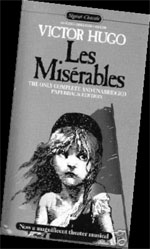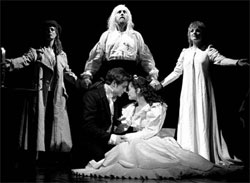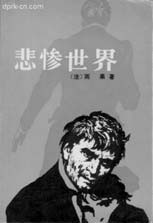Reviews: BOOK
 Les Miserables
Les Miserables
Writing that dazzles, even in translation from French to English, for nearly 1,500 pages; an explication of Napoleon's defeat at Waterloo; a tour of the Paris sewer system; meditations on liberty and revolution, crime and punishment, religion and love all hung upon a mesmerizing plot with unremitting suspense of the sort that keeps a reader awake into the wee hours.
I went back 145 years to find such a book, a classic often assigned to high schoolers that somehow escaped my notice. Les Misrables, by Victor Hugo, first published in France in 1862, is widely known nowadays through the London and Broadway extravaganza Les Miz.
Inevitably, the musical cannot do justice to Hugo's grasp of the long sweep of history, nor to the erudition of his political analyses and the depth of his philosophical musings. Read this classic, share the sufferings and joys of former chain gang convict Jean Valjean and a panoply of other vividly drawn characters, in a riveting saga of redemption set against the backdrop of 19th-century France yet uncannily relevant to our times.
 My edition: translated by Lee Fabnestock and Norman MacAfee, based on translations by C. E. Wilbour (New York: Signet, 1987).
My edition: translated by Lee Fabnestock and Norman MacAfee, based on translations by C. E. Wilbour (New York: Signet, 1987).
Judy Polumbaum
Hugo's work in China
In China, Les Misrables has been rendered Beican Shijie literally, "miserable world". A 1929 translation by Li Dan and his wife Fang Yu, who had studied in Paris, was never published, and the manuscript was lost during the war years. Their subsequent attempt, in 1958, was destroyed during the turmoil of the "cultural revolution" (1966-76). Li passed away in 1977 and his wife in 2002; their completed edition finally came out in 1984.
A succession of Chinese admirers of Victor Hugo had preceded the couple, with a Shanghai newspaper serialized the first Chinese translation of a portion of Les Misrables in 1903, writes Li Meiying in a 1985 article in the UNESCO Courier. The translator was Su Zigu (or Su Manshu).
Others followed, including an excerpt translated by Lu Xun (1881-1936), China's best-known modern writer. The year 1935, half a century after Hugo's death, saw publication of a study of Les Misrables by writer Mao Dun (1896-1981), and writer Ba Jin (1904-2005) was another admirer. As Chinese interest in Western literature revived during the 1970s-80s, new versions of Hugo's work, as well as conferences and published studies on the French author, proliferated.
As for the musical known as Les Miz (pictured), already performed in 38 countries and in 21 languages, a Chinese language show is scheduled to premiere in 2008. The project is a collaboration between Cameron Mackintosh, producer of the Royal Shakespeare Company's version, and the Shanghai Grand Theater.
JP
(China Daily 04/24/2007 page20)














